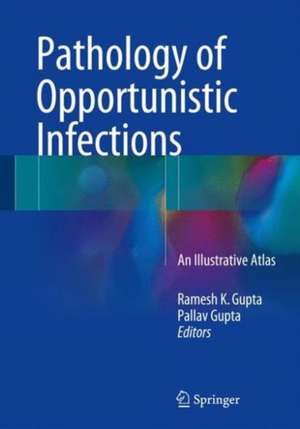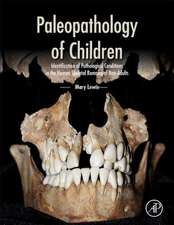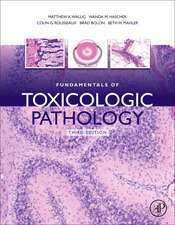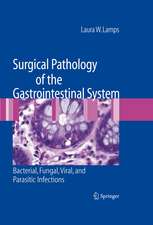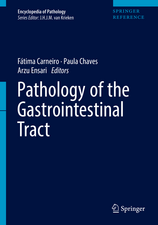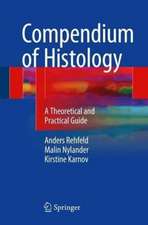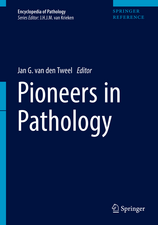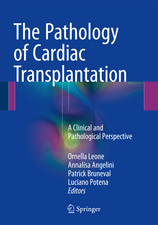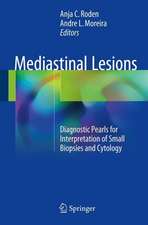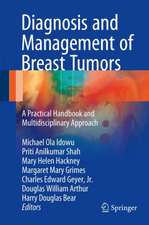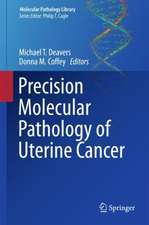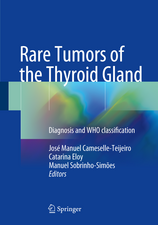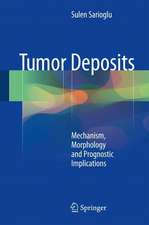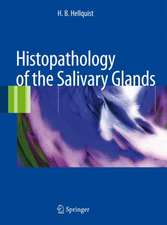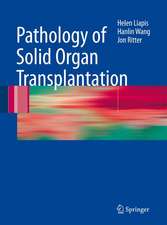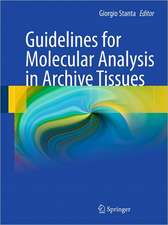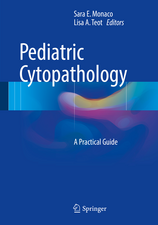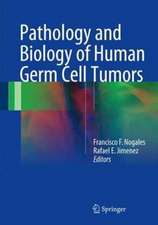Pathology of Opportunistic Infections: An Illustrative Atlas
Editat de Ramesh K. Gupta, Pallav Guptaen Limba Engleză Hardback – 17 noi 2016
Over the past few decades, certain therapeutic advances –such as organ transplantation, prolonged use of steroids and other immunosuppressants for various diseases and chemo-radiotherapy for the treatment of malignant tumors– have, in addition to improving patient survival, also contributed to significant aberrations in the patients’ host defense mechanisms. Further, due to compromised host resistance, certain clinical conditions such as HIV/AIDS, diabetes mellitus, and major organ-related problems like chronic renal failure, chronic liver and chronic lung diseases etc., make these patients potentially vulnerable to a variety of opportunistic infections.
The challenges posed by the opportunistic pathogens are enormous. Early clinical suspicion, prompt morphological identification and timely management are essential so as to prevent high morbidity and mortality associated with these infections. These pathogens often go unnoticed due to a lack of familiarity with their morphological appearances in the context of histopathological and/or cytological evaluation.
| Toate formatele și edițiile | Preț | Express |
|---|---|---|
| Paperback (1) | 703.45 lei 38-44 zile | |
| Springer Nature Singapore – 29 iun 2018 | 703.45 lei 38-44 zile | |
| Hardback (1) | 1103.95 lei 3-5 săpt. | |
| Springer Nature Singapore – 17 noi 2016 | 1103.95 lei 3-5 săpt. |
Preț: 1103.95 lei
Preț vechi: 1162.06 lei
-5% Nou
Puncte Express: 1656
Preț estimativ în valută:
211.24€ • 221.11$ • 175.82£
211.24€ • 221.11$ • 175.82£
Carte disponibilă
Livrare economică 10-24 martie
Preluare comenzi: 021 569.72.76
Specificații
ISBN-13: 9789811016684
ISBN-10: 9811016682
Pagini: 121
Ilustrații: XVIII, 175 p. 105 illus. in color.
Dimensiuni: 178 x 254 x 16 mm
Greutate: 0.66 kg
Ediția:1st ed. 2017
Editura: Springer Nature Singapore
Colecția Springer
Locul publicării:Singapore, Singapore
ISBN-10: 9811016682
Pagini: 121
Ilustrații: XVIII, 175 p. 105 illus. in color.
Dimensiuni: 178 x 254 x 16 mm
Greutate: 0.66 kg
Ediția:1st ed. 2017
Editura: Springer Nature Singapore
Colecția Springer
Locul publicării:Singapore, Singapore
Cuprins
Introduction to Opportunistic Infections.- Opportunistic Bacterial Infections.- Opportunistic Viral Infections.- Opportunistic Fungal Infections.- Opportunistic Parasitic Infections.- Mixed Opportunistic Infections.
Notă biografică
Prof. Gupta is a medical graduate (MBBS) and Postgraduate MD (Path & Bact) from King George’s Medical College, Lucknow. He was awarded several prizes and honors both during undergraduate and postgraduate medical career. After having served in various academic positions such as Assistant Professor, Associate Professor and Professor for about 20 years in UP State Government Medical Colleges, in the year 1992 he joined as Professor and Head of Department Pathology at the Sanjay Gandhi Postgraduate Institute of Medical Sciences, Lucknow. At this upcoming medical institute, he developed the Department of Pathology to its best and initiated MD (Pathology) postgraduate course and established specialty pathology training and post-doctorate certificate course in Renal Pathology. At Sanjay Gandhi PGI he made tremendous academic and administrative contributions and had also been the Dean and Director of the Institute.
Prof. Gupta has keen interest in research. Renal Pathology, Transplant Pathology, Cardiac Pathology and Pathology of Opportunistic infections have been some of the specialized areas of his academic activities. He has completed more than 20 research projects funded by International, National and Regional scientific bodies and has contributed more than 140 original research articles in various National and International journals of high repute. He has several book references and book chapters to his credit and has published five manuals and proceedings and a book on “Pathology of Opportunistic Infections in Tropics.”
Prof Gupta has more than 45 years of professional, academic and academic experience to his credit. During this period he had been the guide and mentor to more than 50 postgraduates in Pathology and allied sciences. He is recognized as academician of high order by the peers and has been invited to deliver several prestigious Orations and Guest lecturers at various National and International Scientific meets. For his academic contributions, he has been conferred with several Honors and Awards including prestigious Fellowship of National Academy of Medical Sciences (India). Prof Gupta has most successfully organized several national and international scientific meets including APCON Gold IAPM National Conference, III International CME on Surgical Pathology and Ist International CME on Renal Pathology. He has held high offices of Vice-President and President of Indian Association of Pathologists and Microbiologists and several other National Academic Bodies. In 2005 he formed Indian Society of Renal and Transplant Pathology of which he had been the founder President. He had been on the Editorial board of some of the prestigious medical journals and reviewer to various scientific and academic organizations.
Dr. Pallav Gupta, a postgraduate in pathology has obtained specialized training and postdoctorate certificate in the field of renal and transplant pathology. He is a diagnostic histopathologist of repute and special areas ofhis academic interest include renal and transplant pathology. He is presently working as Consultant Pathologist and renal pathologist at Sir Ganga Ram Hospital, New Delhi. He is DNB thesis guide for post graduates in pathology and has authored more than 25 publications in peer reviewed national and international journals. In recognition of his academic achievements he has been awarded MAMS by National Academy of Medical Sciences, New Delhi, India. He is also executive member of Indian Society of Renal and Transplant Pathology besides being life member of several national and international academic bodies. He is reviewer of several international journals.
Prof. Gupta has keen interest in research. Renal Pathology, Transplant Pathology, Cardiac Pathology and Pathology of Opportunistic infections have been some of the specialized areas of his academic activities. He has completed more than 20 research projects funded by International, National and Regional scientific bodies and has contributed more than 140 original research articles in various National and International journals of high repute. He has several book references and book chapters to his credit and has published five manuals and proceedings and a book on “Pathology of Opportunistic Infections in Tropics.”
Prof Gupta has more than 45 years of professional, academic and academic experience to his credit. During this period he had been the guide and mentor to more than 50 postgraduates in Pathology and allied sciences. He is recognized as academician of high order by the peers and has been invited to deliver several prestigious Orations and Guest lecturers at various National and International Scientific meets. For his academic contributions, he has been conferred with several Honors and Awards including prestigious Fellowship of National Academy of Medical Sciences (India). Prof Gupta has most successfully organized several national and international scientific meets including APCON Gold IAPM National Conference, III International CME on Surgical Pathology and Ist International CME on Renal Pathology. He has held high offices of Vice-President and President of Indian Association of Pathologists and Microbiologists and several other National Academic Bodies. In 2005 he formed Indian Society of Renal and Transplant Pathology of which he had been the founder President. He had been on the Editorial board of some of the prestigious medical journals and reviewer to various scientific and academic organizations.
Dr. Pallav Gupta, a postgraduate in pathology has obtained specialized training and postdoctorate certificate in the field of renal and transplant pathology. He is a diagnostic histopathologist of repute and special areas ofhis academic interest include renal and transplant pathology. He is presently working as Consultant Pathologist and renal pathologist at Sir Ganga Ram Hospital, New Delhi. He is DNB thesis guide for post graduates in pathology and has authored more than 25 publications in peer reviewed national and international journals. In recognition of his academic achievements he has been awarded MAMS by National Academy of Medical Sciences, New Delhi, India. He is also executive member of Indian Society of Renal and Transplant Pathology besides being life member of several national and international academic bodies. He is reviewer of several international journals.
Textul de pe ultima copertă
This book presents the morphological details of various opportunistic pathogens for prompt identification, which is essential for the proper management of various bacterial, viral, fungal and parasitic infections encountered in immunocompromised patients.
Over the past few decades, certain therapeutic advances –such as organ transplantation, prolonged use of steroids and other immunosuppressants for various diseases and chemo-radiotherapy for the treatment of malignant tumors– have, in addition to improving patient survival, also contributed to significant aberrations in the patients’ host defense mechanisms. Further, due to compromised host resistance, certain clinical conditions such as HIV/AIDS, diabetes mellitus, and major organ-related problems like chronic renal failure, chronic liver and chronic lung diseases etc., make these patients potentially vulnerable to a variety of opportunistic infections.
The challenges posed by the opportunistic pathogens are enormous. Early clinical suspicion, prompt morphological identification and timely management are essential so as to prevent high morbidity and mortality associated with these infections. These pathogens often go unnoticed due to a lack of familiarity with their morphological appearances in the context of histopathological and/or cytological evaluation.
Over the past few decades, certain therapeutic advances –such as organ transplantation, prolonged use of steroids and other immunosuppressants for various diseases and chemo-radiotherapy for the treatment of malignant tumors– have, in addition to improving patient survival, also contributed to significant aberrations in the patients’ host defense mechanisms. Further, due to compromised host resistance, certain clinical conditions such as HIV/AIDS, diabetes mellitus, and major organ-related problems like chronic renal failure, chronic liver and chronic lung diseases etc., make these patients potentially vulnerable to a variety of opportunistic infections.
The challenges posed by the opportunistic pathogens are enormous. Early clinical suspicion, prompt morphological identification and timely management are essential so as to prevent high morbidity and mortality associated with these infections. These pathogens often go unnoticed due to a lack of familiarity with their morphological appearances in the context of histopathological and/or cytological evaluation.
Caracteristici
Written by experts in the field of transplantation pathology Provides up-to-date information on the multimodal approach for the morphological identification of opportunistic pathogens Includes representative photomicrographs of various opportunistic pathogens for easy identification
